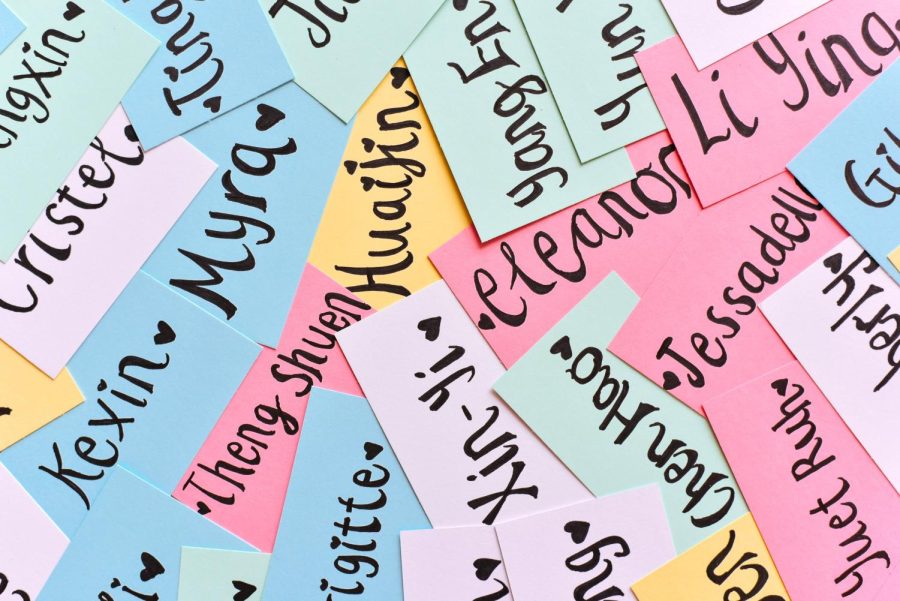The “Ethnic Name Thing”: What It’s Like When People Struggle to Pronounce Your Name
The “Ethnic Name Thing”: What It’s Like When People Struggle to Pronounce Your Name
October 27, 2022
This story was selected by Best of SNO for an Excellence in Writing Badge. Congratulations, Emily!
Roll call on the first day of class usually goes without a hitch for most. The professor calls your name, you raise your hand, say “here,” and the next name is called.
For those with non-English sounding names, however, the process usually includes a short pronunciation lesson. Sometimes the teacher picks up the pronunciation right away. Other times professors will struggle the entire term with enunciating, often distorting the name or not calling on that student altogether.
Saumya Gupta, a 25-year-old student at Boston University’s School of Medicine, has coined it the “ethnic name thing.”
“Your teacher is going down the roll call sheet and then they stop and you know it’s your name,” she said. “You definitely feel that little awkwardness in class.”
This process is familiar to many with non-English names.
After moving to California from India at seven years old, Gupta used to go by “Mya,” an adaptation of her given name to people who couldn’t pronounce her name. Now, however, she doesn’t use it as often.
“I think I’ve become more comfortable with my name,” she said. “I think it was some sort of adaptation I created for myself at that age just to fit in a little more. As I grew up and I saw more people like me accepting their name, I thought I should do that too.”
Gupta has also found that it’s easier now to confront mispronunciation.
“Growing up, as I’ve become more comfortable with [my name], I’ve become more comfortable with correcting it,” she said. “I wasn’t brave enough to correct it back then, so that’s probably why they kept mispronouncing it.”
Qizhen Cai, an international business and administration major student from China at Northeastern University, has her name mispronounced often, whether that be in class or in the workplace.
“Because I am on Co-Op now, when I started at the company, lots of people called me “Kit-zen” or “Keetz-en,”which is not the right pronunciation,” said the 22-year-old. Even so, she isn’t bothered by it.
“I know that it’s me so I will accept that,” Cai said. “I know that a lot of Chinese names are hard to pronounce, especially for someone who has an English background.”
Hua Dong, coordinator of the Chinese program at Northeastern University agrees, and believes that mispronouncing a non-English name shouldn’t be considered a microaggression. It’s mostly unintentional because of the language barrier.
“It’s very understandable why this problem is a problem in the first place. It’s so hard for a different culture to pronounce and to master another language,” she said. “I think it’s a general problem for all cultures and all universities, not just the United States.”
Gupta agrees: “I don’t think mispronunciation is a microaggression in itself, I think it’s your effort or willingness to try and get the name correct,” she said. “The microaggression happens when they constantly mispronounce even when you make your best effort to try to correct them,” she continued.
Researcher Ranjana Srinivasan, who holds a doctoral degree in Counseling Psychology from Columbia University and is a practicing psychologist at the Manhattan VA Medical Center, has found that there is a tendency for white European names and whiteness in general to be perceived as the norm. This results in racial minorities with names of religious and ethnic origins experiencing discrimination and ostracism.
Dong offered a personal anecdote of a friend, Xiao Dan, who moved to the United States from China around 30 years ago. While studying at the University of Iowa, she had a hard time with professors and peers pronouncing her name, and one professor even told her to adapt a more “Americanized” name to make it easier for others to pronounce. She did, and began going by “Judy.”
An Indian classmate ended up telling her she didn’t “look” or “feel” like a Judy. What followed was a “wake up moment,” where Xiao Dan decided to keep going by her given name and developed strategies to help others pronounce it easier.
“She didn’t have a very strong conscience about how one’s name is connected to their identity at the very beginning,” said Dong. Many students just want to comply and be like their American peers. “For an international student who has to deal with so many more strange things academic wise, culture wise, social wise, they just want to make it easier and change their first name into a more Westernized name,” Dong added.
Dong herself went by the name Judy for a part time job when she was a college student in Boston, but quickly decided to just go by her given name.
“My first name, Hua, is easier, but still has a lot of mispronunciations… I went by that because I think it’s me,” she said. “[Changing one’s name] is almost like a separation from your own identity.”
Names are important identifiers that can tell the story of a person’s ethnicity, cultural background and familial lineage.
“The reason [Chinese people] have such a specific name is because their family has put a lot of meaning… into the process,” Dong said. “If they change it to some random thing, then the meaning is lost.”
Some, however, embrace more English sounding nicknames as a part of their Asian American identity.
Joylyn “Mimi” Freund, a 19-year-old psychology major at Northeastern University, was adopted from China at 2 years old. She was given a Chinese name at the orphanage, Mixue, but her parents named her Joylyn. They also gave her the nickname “Mimi,” which Freund uses almost exclusively now. It’s an adaptation of her Chinese name.
Though she uses her Chinese name in her Chinese courses, which she utilizes to connect with her Asian identity, Freund prefers her nickname.
“The whole Chinese language and difference in phonetics and all that would be kind of hard for people to say, so I stick with Mimi,” she said.
Freund participates in NU Calls, a student organization at Northeastern University that “bridges native and fluent speakers” with students who want to learn about that language. She believes it’s an option for those wanting to be more mindful of their peers with ethnic sounding names.
Dong suggested offering courses on language and culture might be a way to teach more people about pronouncing non-westernized names. She also mentioned that specific classes on pronouncing the most common names and sounds would create a more welcoming environment.
Most just want to feel more comfortable with their names and correcting others. Those doing the pronunciation, however, should also be more comfortable.
“The learning has to come both ways…to educate both sides about the importance of names and how it relates to one’s identity and also the society of the culture beyond the name,” Dong said.



